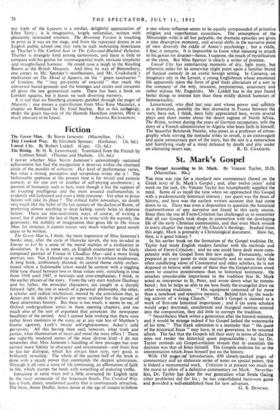St. Mark's Gospel
The Gospel According to St. Mark. By Vincent Taylor, D.D. (Macmillan. 50s.) THE time was ripe for a standard new-commentary (based on the Greek text) of St. Mark's Gospel ; and, after twelve years' solid work on the task, Dr. Vincent Taylor has triumphantly supplied the need. Some of us recall the time when we approached this Gospel with a predominantly historical interest ; our quest was the Jesus of history, and here was the earliest written account that had come down to us. There was even a disposition to question the historical trustworthiness of any narrative not found in this early source. Since then the rise of Form-Criticism has challenged us to remember that all our Gospels took shape in connection with the developing life of the early Christian communities, and that even Mark reveals in every chapter the stamp of the Church's theology. Studied from this angle, Mark is primarily a Christological document. How far, then, is it good history ?
In his earlier book on the formation of the Gospel tradition Dr. Taylor had made English readers, familiar with the methods and claims of Form-Criticism; and no one could have dealt more com- petently with the Gospel from this new angle. Fortunately, while prepared at every point to state succinctly and to assess fairly the often conflicting views of Continental and other scholars, he is not disposed to believe with some of them that the Gospel-stories owed more to creative inventiveness than to historical testimony. He attaches considerable importance to the tradition that St. Mark acted as interpreter to St. Peter, and wrote down what he remem- bered ; but he helps us alit) to see how freely the evangelist drew on other existing traditions. " His equipment consisted of far more than a notebook and retentive memory. Behind him lay the teach- ing activity of a living Church." Mark's Gospel is claimed as a work -of first-rate historical importance ' • and if (as some scholars would urge) doctrinal, catechetical and liturgical motives entered into the composition, they did little to corrupt the tradition.
" Nevertheless Mark writes a generation after the historic ministry, and it would be strange indeed if his Gospel lacked the watermarks of his time." This frank admission is a reminder that " the quest of the historical Jesus " may have, in our generation, to be resumed afresh. The fact that the Gospels tell their story in terms of doctrine does not render the .historical quest impracticable ; for (as Dr. Taylor reminds us) Gospel-criticism reveals that in essentials the doctrine was that of Jest's himself. The Gospels enshrine for us the interpretation which Jesus himself put on the history.
With 150 pages4ktrintroduction, 450 closely-packed pages of commentary ancran elaborate series of notes on special points, this is indeed a monumental work. Criticism is at present too much on the move to allow of a definitive commentary on Mark. Neverthe- ' less, Dr. Taylor has done for our generation what Swete (facing other problems) did for his • he has consolidated hard-won gains and provided a well-established base for new advances.
G. S. DUNCAN.







































 Previous page
Previous page